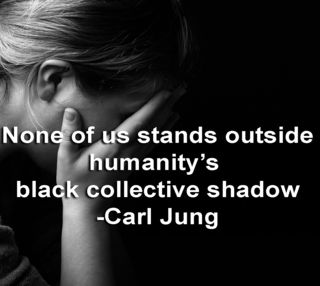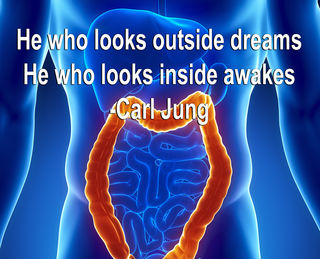President Donald Trump
Is America's Shadow Playing the Trump Card?
Trying to make some sense of it all
Posted August 1, 2016
In Jungian psychology, “the shadow” houses our ugly traits: hatred, aggression, cruelty, greed, sexual impropriety, etc. [1-4] We repress these unacceptable traits in our unconscious, like an untidy teenager sweeps snack and wardrobe casualties underneath his or her bed. When it is an individual mind, this repression creates a rational person, when it is the collective conscious it creates an orderly society.
Still, the shadow aspects of our personal and collective consciousness lurk in the unconscious like dirty socks and pizza crust swept under the bed of a teenager’s seemingly clean room. And eventually the shadow aspect will emerge like that teen’s parent will inevitably walk into his or her room and say, “Where’s that smell coming from” and look under the bed. When it emerges in individuals, you get people doing horrible things. When it's a nation’s psyche, an orderly society becomes chaotic, such as Europe in World War I.[5]
Millions of angry, frustrated Americans support Trump, and it galvanized his success [6]. Others see Trump as a volatile, dangerous man. If this is true, is his popularity evidence of America’s shadow aspect? Does it explain why Trump has survived many things that historically has been political suicide for presidential candidates?

So then, the question is, has America’s shadow aspect emerged? If so, is our nation surrounded by denial and disaster?
Are people who support third party candidates that are unlikely to win the election in denial about the seriousness of America’s shadow aspect? Or are those that do not support them in denial?
Are Clinton supporters in denial in thinking that Clinton is the rational choice and that Trump and his followers are the problems, not America’s shadow aspect?
Have Trump supporters surrendered to America’s shadow aspect and are in disaster mode?
America has problems. We always have, and probably always will—that is generic to social species, not America. Like any social species problem, our problems must be fixed by individual daily choices that choose the high road over the demons of the shadow aspect.
Choosing the high road requires the thinking part of the brain prevailing over the emotional part of the brain because the latter dispatches behaviors associated with the shadow aspect. Accomplishing that in the brain requires ample supplies of serotonin. For this, a better understanding of the microbiome and how gut bacteria influence emotional management is necessary because the gut produces more serotonin than the brain does.[7-19]

A century ago women couldn’t vote; blacks couldn’t drink out of the same water fountains as whites and being gay was illegal. We are capable of positive change.
So I think we will contain America’s shadow because it is not nearly as ardent as our indomitable will to achieve the principles that inspired our nation. I know in my heart, and more importantly my gut that as we go about our daily lives interacting with ourselves and with each other that our shadow aspects will not eclipse our children’s tomorrows. As always, remain fabulous and phenomenal.
Join my email list to receive notifications of new posts
UCLA Center for the Neurobiology of Stress
References
1. Skea, B.R., Sabina Spielrein: out from the shadow of Jung and Freud. J Anal Psychol, 2006. 51(4): p. 527-52.
2. Lammers, A.C., Professional relationships in dangerous times: C. G. Jung and the Society for Psychotherapy. J Anal Psychol, 2012. 57(1): p. 99-119.
3. Meredith-Owen, W., Jung's shadow: negation and narcissism of the Self. J Anal Psychol, 2011. 56(5): p. 674-91.
4. Lammers, A.C., Jung and White and the God of terrible double aspect. J Anal Psychol, 2007. 52(3): p. 253-74.
5. Chopra, D., America’s Shadow: The Real Secret of Donald J. Trump. 2016, Huffington Post: New York.
6. Chomsky, N. Today’s GOP is ‘the most dangerous’ threat to the species ‘in human history’. 2016; Available from: http://www.rawstory.com/2016/05/noam-chomsky-todays-gop-is-the-most-dan….
7. Abu-Akel, A., The neurochemical hypothesis of 'theory of mind'. Med Hypotheses, 2003. 60(3): p. 382-6.
8. Aou, S., [Physiology of appetite and feeding behavior: introduction]. Nihon Rinsho, 2001. 59(3): p. 407-12.
9. Artiukhov, V.G. and G.A. Vashanov, [Serotonin as a photoprotector of the oxygen-transporting function of hemoglobin]. Biofizika, 1993. 38(4): p. 580-3.
10. Barragan-Mejia, M.G., et al., Effect of nutritional status and ozone exposure on rat brain serotonin. Arch Med Res, 2002. 33(1): p. 15-9.
11. Bearer, E.L., et al., Reward circuitry is perturbed in the absence of the serotonin transporter. Neuroimage, 2009. 46(4): p. 1091-104.
12. Bellush, L.L. and W.N. Henley, Altered responses to environmental stress in streptozotocin-diabetic rats. Physiol Behav, 1990. 47(2): p. 231-8.
13. Bitran, D. and E.M. Hull, Pharmacological analysis of male rat sexual behavior. Neurosci Biobehav Rev, 1987. 11(4): p. 365-89.
14. Bjorntorp, P., Neuroendocrine abnormalities in human obesity. Metabolism, 1995. 44(2 Suppl 2): p. 38-41.
15. Borre, Y.E., et al., The impact of microbiota on brain and behavior: mechanisms & therapeutic potential. Adv Exp Med Biol, 2014. 817: p. 373-403.
16. Farmer, A.D., H.A. Randall, and Q. Aziz, It's a gut feeling: how the gut microbiota affects the state of mind. J Physiol, 2014. 592(Pt 14): p. 2981-8.
17. Forsythe, P. and W.A. Kunze, Voices from within: gut microbes and the CNS. Cell Mol Life Sci, 2013. 70(1): p. 55-69.
18. Grenham, S., et al., Brain-gut-microbe communication in health and disease. Front Physiol, 2011. 2: p. 94.
19. Moloney, R.D., et al., The microbiome: stress, health, and disease. Mamm Genome, 2014. 25(1-2): p. 49-74.




